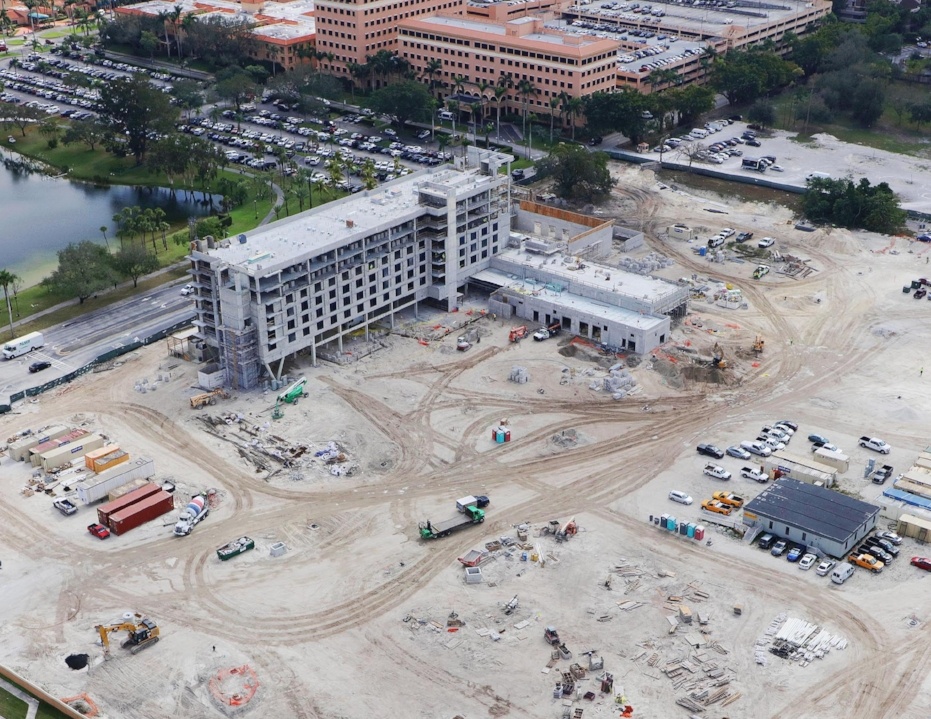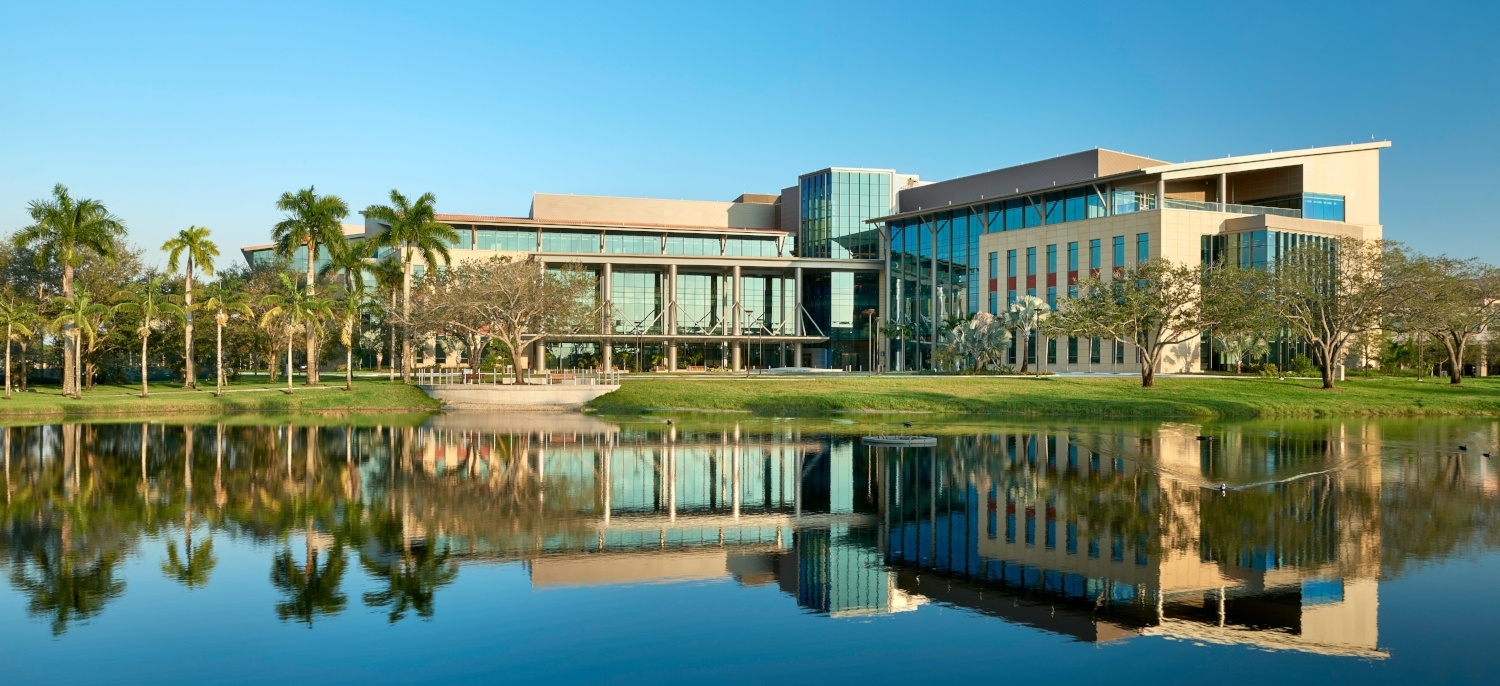Summary:
South Florida Baptist builds a Hilton Hotel on campus, a way to generate revenue from alternative sources related to its health care services.
A partnership opportunity gives Baptist Health South Florida a revenue-generating amenity expected to draw more international patients.
In today’s changing health care landscape, hospital leaders know their business isn’t just about treating patients anymore. It’s also about finding nontraditional sources of revenue. Baptist Health South Florida is trying something new: the hotel business.
The Hilton Miami Dadeland, which broke ground in December 2016, is scheduled to open in late 2018 and will feature 184 guest rooms, 34 long-term-stay rooms, meeting space and other amenities targeted to guests who are patients at the hospital or family, or are doing business or visiting nearby.

The Hilton Miami Dadeland celebrated its topping off construction milestone in January 2018. The seven-story development by Baptist Health South Florida is expected to open in late 2018. | Baptist Health South Florida
“Every day, we get paid less and less for the services we provide within the four corners of our facility,” said Ana Lopez-Blazquez, chief executive officer for Baptist Health Enterprises. “It’s a revenue diversification strategy. You need to figure out how to generate revenue from alternative sources and do things that might be tangential to health care,” she said.
The hotel, operated by Interstate Hotels and Resorts, will be situated on the main campus of Baptist Health and Miami Cancer Institute, in the Kendall suburb of Miami, and will also feature a wellness center and a farm-to-table restaurant. “We really can’t have anything unhealthy attached to a hospital,” Lopez-Blazquez said.
It will be a bit smaller than other Hilton properties, which are usually about 250 rooms, and will have a ballroom and meeting space. “It’s going to have the amenities you would expect in a full-service Hilton Hotel,” said Matt Wehling, senior vice president of development for the United States and Canada of Hilton Worldwide. The wellness center will be about three times larger than regular hotel gyms, with a fitness center, consultation rooms, massage rooms, a studio and a lap pool.
The hotel complements the $430 million, 395,000-square-foot Miami Cancer Institute, which opened in January 2017. “We are building a world-class cancer destination institute. It made tremendous sense to build a hotel,” Lopez-Blazquez said.

Many patients are expected to travel long distances for care at the Miami Cancer Institute, which opened in 2017 on the Baptist Health campus. | Baptist Health South Florida
Many patients and their families will be traveling long distances to receive some of the new treatments at the cancer center, including the region’s first proton therapy center. The center expects to draw patients not only from South Florida, but also from the Caribbean, Latin America and elsewhere. Medical tourism is not new for the system. Baptist’s network sees more than 10,000 patients annually from outside the United States, according to a report in Becker’s Hospital Review, including some from Canada and as far away as Europe and Asia.
“We need to facilitate every aspect of care for a patient and their family. If someone is coming to our service area, they need a place to stay,” Lopez-Blazquez said, adding many patients might need only a short daily treatment and do not need to be in a hospital setting. “A lot of the patients are mobile and active, they are just having treatment,” she said. “If treatment takes only an hour a day, you have to have something to do with your time.”
Typically, Hilton does not have rooms geared toward long-term stays, but this property will. “We will offer other room types as the market demands and this one is unique,” Wehling said. “We did feel it was important to offer a few rooms for that type of stay.”
Shuttles will run between the hotel and the hospital, easing one more worry for patients and families. “Getting from place A to place B is easy.” Lopez-Blazquez said.
Baptist Health spent about three years planning the cancer institute and hotel, using focus groups of patients to learn what was important to them. One thing they mentioned was design. “They wanted things that were alive, not sterile,” Lopez-Blazquez said.
“The architect has used best practices from both the hotel and medical facilities,” Wehling said. The decor will be a Mediterranean theme and will feature a pineapple design. Not only is that the symbol of Baptist Health, it also represents hospitality. “It works well that it is Baptist’s logo,” he said.
It’s all part of the plan to diversify the health system and provide what’s best for patients. Because of how reimbursements have changed over the years, patients spend less time in hospitals, but still might be under care.
“If you don’t have to be in a hospital setting, you’re not in a hospital setting.” Lopez-Blazquez said. “We have the land, we have the opportunity, and we determined a full-service hotel was the absolute right thing to do for this community.”
Tiffani Sherman is a freelance journalist based in Florida.
Topics
Environmental Influences
Differentiation
Performance
Related
How to Approach Business Ethics as Global Consensus Breaks DownThe Pandemic Proved That Remote Leadership WorksAmid Plummeting Diversity at Medical Schools, a Warning of DEI Crackdown’s ‘Chilling Effect’Recommended Reading
Strategy and Innovation
How to Approach Business Ethics as Global Consensus Breaks Down
Strategy and Innovation
The Pandemic Proved That Remote Leadership Works
Strategy and Innovation
Amid Plummeting Diversity at Medical Schools, a Warning of DEI Crackdown’s ‘Chilling Effect’
Strategy and Innovation
How Classical Hematology Aims to Meet the Growing Healthcare Needs of an Aging American Population
Strategy and Innovation
Dogs Paired With Providers at Hospitals Help Ease Staff and Patient Stress
Strategy and Innovation
Health Policy: What’s On the Table for the Second Trump Administration?
